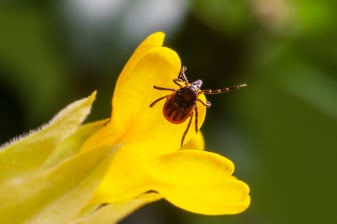We’re in the throes of tick season in New England; in fact, our relatively mild winters the past few years have meant ticks are active almost year-round. This extended period of tick activity leaves people and pets increasingly vulnerable to tick bites and tick-borne diseases. They say know your enemy – so here’s what you should know about New England ticks.
The Basics

The most common species of tick in our area are the deer tick and dog tick; however, the lone star tick has recently made its way to New England, including Cape Cod and the Islands. Ticks are usually reddish-brown or orange-brown, and the adult lone star tick will have a small white marking on the abdomen. While the flat, oval-shaped body is generally small, about 1/8th of an inch, a well-fed tick may become larger and rounder, and coloring may appear lighter. Because ticks are arachnids, not insects, they have eight legs.
What Diseases Do Ticks Carry?
Throughout the United States, ticks can spread a number of diseases through their bite, including: Lyme disease, babesiosis, anaplasmosis, Rocky Mountain Spotted Fever, tularemia, Powassan disease, and more. Any of these diseases can result in illness ranging from mild symptoms to severe infection.
Where Are They Found?
Ticks are often hiding in wooded areas, tall grass, and brush. They will climb to the top of grasses and shrubs, stretch their legs, and grab hold of a host as it passes by. Because of their small stature, it is easy to overlook a tick – it’s important to know how to check yourself and others after time spent outdoors.
Can Ticks Get Inside My House?
Ticks can be carried into your home on clothing and shoes, on your body, and on pets. Mice, one of the most accessible hosts for young ticks, can also carry the bloodsucking pests inside.
What Can I Do?
When spending time outdoors:
Use an EPA-approved repellent
Wear light colored clothing to make ticks easier to spot
Wear long sleeves and pants when possible; tuck pants into socks
Stick to the middle of trails and avoid tall grass and brush
Frequent body checks on people and pets
Know how to properly remove a tick
In your yard:
Keep grass trimmed
Eliminate leaf litter and yard waste
Keep wood piles away from your house – ticks and all kinds of pests love these spots
For added protection from ticks, sign up for a treatment plan with Burgess Pest. There’s a plan for your property, from a standalone program to our Pad Protection Plans – request a free estimate to find out which is right for you.


